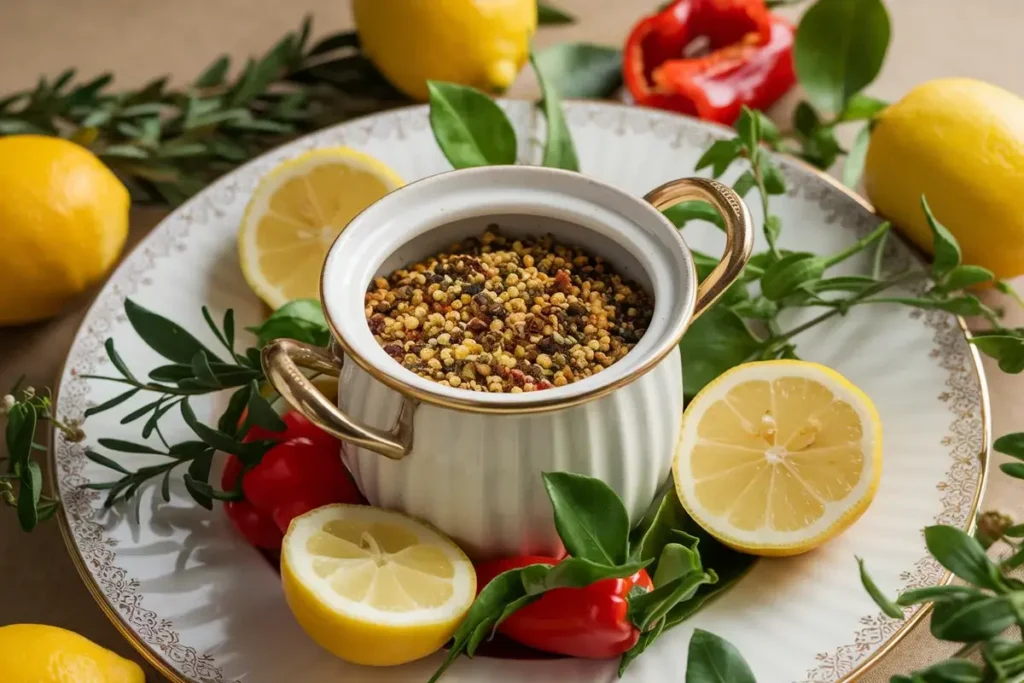Lemon pepper seasoning has become a favorite in kitchens worldwide, and it’s easy to see why. This blend of zesty lemon and sharp black pepper brings a burst of flavor to nearly any dish, whether it’s grilled chicken, roasted vegetables, or even popcorn. But what exactly makes this combination so irresistible?
In this article, we’ll explore the origins of lemon pepper seasoning, its unique flavor profile, and why it works so well with a variety of foods. We’ll also dive into its health benefits and creative uses that go beyond the typical recipe. By the end, you’ll see why this seasoning deserves a prime spot in your pantry.
The Origins of Lemon Pepper Seasoning
Lemon pepper seasoning may seem like a modern invention, but its roots go back much further. The blend of lemon zest and black pepper is an evolution of basic ingredients that have been used in kitchens for centuries. Lemons, native to Asia, have been used in cooking since ancient times to add brightness and acidity to dishes. Black pepper, known as the “king of spices,” has been prized for its heat and depth of flavor.
Over time, cooks began experimenting with different spice combinations, and the pairing of lemon and pepper was a natural hit. Today, you can find variations of this seasoning in different cuisines, from Mediterranean dishes to Southern-style lemon pepper wings.
The Unique Flavor Profile of Lemon Pepper Seasoning

What makes lemon pepper seasoning stand out from other spice blends is its ability to balance tangy, citrusy notes with a spicy kick. Here’s a closer look at the individual components:
- Lemon: The zest of the lemon is packed with natural oils that give a bright, fresh flavor. The acidity from the lemon cuts through the richness of meats and adds a tangy, slightly sweet taste to any dish.
- Black Pepper: Known for its bold, pungent heat, black pepper brings depth and warmth. It also enhances the flavors of other ingredients, making it a versatile spice in many savory and even sweet applications.
Together, these two ingredients create a harmonious blend of tangy and spicy that livens up nearly anything it touches. It’s no wonder lemon pepper seasoning has become a kitchen staple, especially for those looking to add flavor without relying on heavy sauces.
Health Benefits of Lemon Pepper Seasoning
In addition to its delicious flavor, lemon pepper seasoning offers some surprising health benefits. For one, it’s a great way to add a burst of taste to your meals without loading up on calories. This makes it an excellent alternative to richer, calorie-dense seasonings like butter or creamy sauces.
Here are some of the key health perks:
- Low-calorie flavor: Lemon pepper is virtually calorie-free, making it perfect for those trying to maintain or lose weight while still enjoying flavorful meals.
- Vitamin C from Lemon: The lemon zest used in the seasoning is a good source of Vitamin C, which boosts your immune system and helps fight inflammation.
- Antioxidants from Black Pepper: Black pepper is rich in antioxidants, which can protect your body from free radicals and promote overall health. It also aids digestion by stimulating the stomach to produce hydrochloric acid, which helps break down food more efficiently. Learn more about the health benefits of black pepper from Healthline.
Why Lemon Pepper Works on Various Proteins
One of the most remarkable things about lemon pepper seasoning is how well it complements a wide range of proteins. Whether you’re cooking chicken, fish, or even plant-based proteins, lemon pepper brings out the natural flavors in every dish.
Here’s why it works so well:
- Chicken: The light, tangy flavors of lemon pepper are a classic match for chicken. Whether you’re roasting a whole bird or grilling chicken breasts, this seasoning enhances the poultry’s natural flavor. For a flavorful twist on chicken wings, you might enjoy this Honey Lemon Pepper Wings Recipe for a perfect balance of sweetness and spice.
- Fish and Seafood: Lemon pepper seasoning works beautifully with fish, especially lighter varieties like tilapia or salmon. The citrus cuts through the richness of the fish, while the pepper adds just the right amount of spice.
- Beef: While less traditional, lemon pepper can be used on beef to give a surprising brightness to the meat. It’s great as a rub for steaks or ribs.
- Vegetarian Proteins: For those following plant-based diets, lemon pepper can liven up tofu, tempeh, and even hearty vegetables like cauliflower and zucchini. The acidity and spice create a flavorful contrast with these more neutral-tasting foods.
The Science Behind the Flavor
Why do lemon and pepper work so well together? The answer lies in the science of taste. Our taste buds respond differently to citrus and spice, which creates a dynamic flavor experience. The acidity of the lemon activates the sour receptors on your tongue, while the black pepper triggers the heat and spice receptors.
When these flavors combine, they stimulate your appetite and enhance the taste of other ingredients in the dish. The result is a seasoning blend that not only stands out but also makes other flavors pop.
Lemon Pepper in Popular Dishes
Lemon pepper seasoning is a key ingredient in several beloved dishes. Its versatility allows it to be used in everything from simple grilled meats to more elaborate recipes. Some of the most popular lemon pepper dishes include:
- Lemon Pepper Wings: A favorite in American cuisine, particularly in Southern states like Georgia, lemon pepper wings have become iconic. The combination of crispy chicken wings and tangy-spicy seasoning is hard to beat. For an irresistible variation, try this Honey Lemon Pepper Wings Recipe, which brings together the tanginess of lemon with the sweetness of honey.
- Grilled Lemon Pepper Salmon: This dish is a go-to for healthy, flavorful meals. The lemon pepper brings out the natural richness of the salmon without overpowering it.
- Roasted Vegetables: Adding lemon pepper to roasted vegetables like broccoli, cauliflower, or carrots can elevate the flavors, making them the star of any meal.
In addition to these classics, chefs and home cooks alike are constantly coming up with new ways to use this seasoning, proving its place as a versatile staple in kitchens around the world.
With the perfect balance of zest and spice, lemon pepper seasoning elevates simple dishes into something extraordinary. Whether you’re sprinkling it on chicken, fish, or vegetables, its bright and bold flavors are sure to enhance any meal.
Homemade vs. Store-bought Lemon Pepper Seasoning
One key decision when incorporating this zesty blend into your cooking is whether to make it from scratch or buy a ready-made version. Both options have their advantages, and understanding the differences can help you decide which works best for your cooking style.
Advantages of Homemade Seasoning
Making your own blend allows for full control over the ingredients and the freshness of the product. You can adjust the balance of lemon zest and pepper to your liking and avoid any unnecessary fillers or preservatives that may be found in pre-packaged versions.
Store-bought Convenience
However, store-bought options can be more convenient. They come pre-mixed and ready to use, with many brands offering high-quality blends that maintain flavor. Just be mindful that some products may include extra ingredients like salt, which can alter the flavor balance.
Creative Uses for the Seasoning Blend

This blend is not just for meats or seafood; it’s much more versatile. Whether you’re looking to enhance snacks or transform a dish, this seasoning can surprise you in creative ways.
Innovative Uses for Extra Flavor:
- Popcorn: Replace butter with this seasoning for a healthier, tangy snack. If you’re looking for a kick, this Honey Hot Wing Sauce pairs beautifully with lemon pepper for a unique wing flavor
- Roasted Nuts: Toss almonds or cashews in the seasoning and roast for a unique twist on savory snacks.
- Pasta: Mix the blend into pasta dishes for an unexpected flavor punch, especially in light cream or olive oil sauces.
- Soups and Stews: Add a sprinkle to your favorite soups for an extra layer of flavor, especially with chicken or seafood-based recipes.
- Salads: It works wonders on both leafy greens and grain-based salads, giving them a citrusy edge.
The versatility of this blend makes it a staple ingredient that can enhance many different meals.
Dietary Preferences and Health Benefits
This seasoning fits well into various dietary plans due to its simple and natural composition. It’s a go-to option for those looking to add flavor without compromising their health goals.
How It Fits Into Popular Diets:
- Keto and Paleo: Since it doesn’t rely on sugars or grains, it’s perfect for keto and paleo followers.
- Vegan and Vegetarian: Adds a burst of flavor to plant-based dishes like grilled vegetables or tofu.
- Low-Sodium and Gluten-Free: When made at home, you can easily keep it free of salt, making it ideal for low-sodium diets. Plus, it’s naturally gluten-free, making it suitable for people with dietary restrictions.
Storage and Shelf Life Tips
Like any spice blend, it’s important to store your seasoning properly to maintain its freshness. Over time, the flavor can weaken, especially if the blend is exposed to air, heat, or moisture.
Tips for Preserving Freshness:
- Store in a cool, dark place away from heat and light.
- Use an airtight container to keep moisture out.
- Homemade versions can last up to six months, while store-bought blends typically last about a year, depending on the ingredients used.
If you notice the scent or flavor weakening, it’s probably time to refresh your stock for optimal taste.
Cultural Influence of This Flavor Combination
This seasoning has made its mark across different culinary traditions, particularly in regions like the Mediterranean, where citrus is a key element in many dishes. But perhaps one of the most famous uses of this blend is found in the American South, specifically in Atlanta.
Atlanta’s Iconic Lemon Pepper Wings
In Atlanta, the tangy seasoning has become a sensation, particularly when used on crispy chicken wings. This dish has grown from a local favorite into a national phenomenon, celebrated for its perfect balance of tang and spice.
Conclusion
This blend of citrus and spice elevates countless dishes, providing the right balance of tanginess and heat to enhance the natural flavors of the ingredients. Whether homemade or store-bought, this versatile seasoning is a must-have for adding a burst of flavor to everything from meats to snacks. Its health benefits, flexibility across different diets, and ability to make any dish shine explain its widespread popularity.
FAQs About Lemon Pepper Seasoning
1. What are the main ingredients in lemon pepper seasoning?
The blend typically consists of lemon zest and black pepper, with some versions also including salt or garlic powder.
2. Can I make this seasoning at home?
Yes, it’s easy to make at home with just dried lemon zest and freshly ground black pepper. You can also customize it by adding other spices or herbs.
3. How long does it stay fresh?
If stored properly in an airtight container, homemade blends will last up to six months. Pre-packaged blends can last up to a year but may lose potency over time.
4. Is it healthy to use in cooking?
Yes! It’s low in calories and contains natural ingredients like Vitamin C from the lemon zest and antioxidants from the pepper, making it a healthier choice than heavy sauces or seasoning mixes.
5. What types of dishes work best with this seasoning?
This blend enhances a wide variety of foods, from chicken and fish to roasted vegetables, soups, and even snacks like popcorn or nuts.

